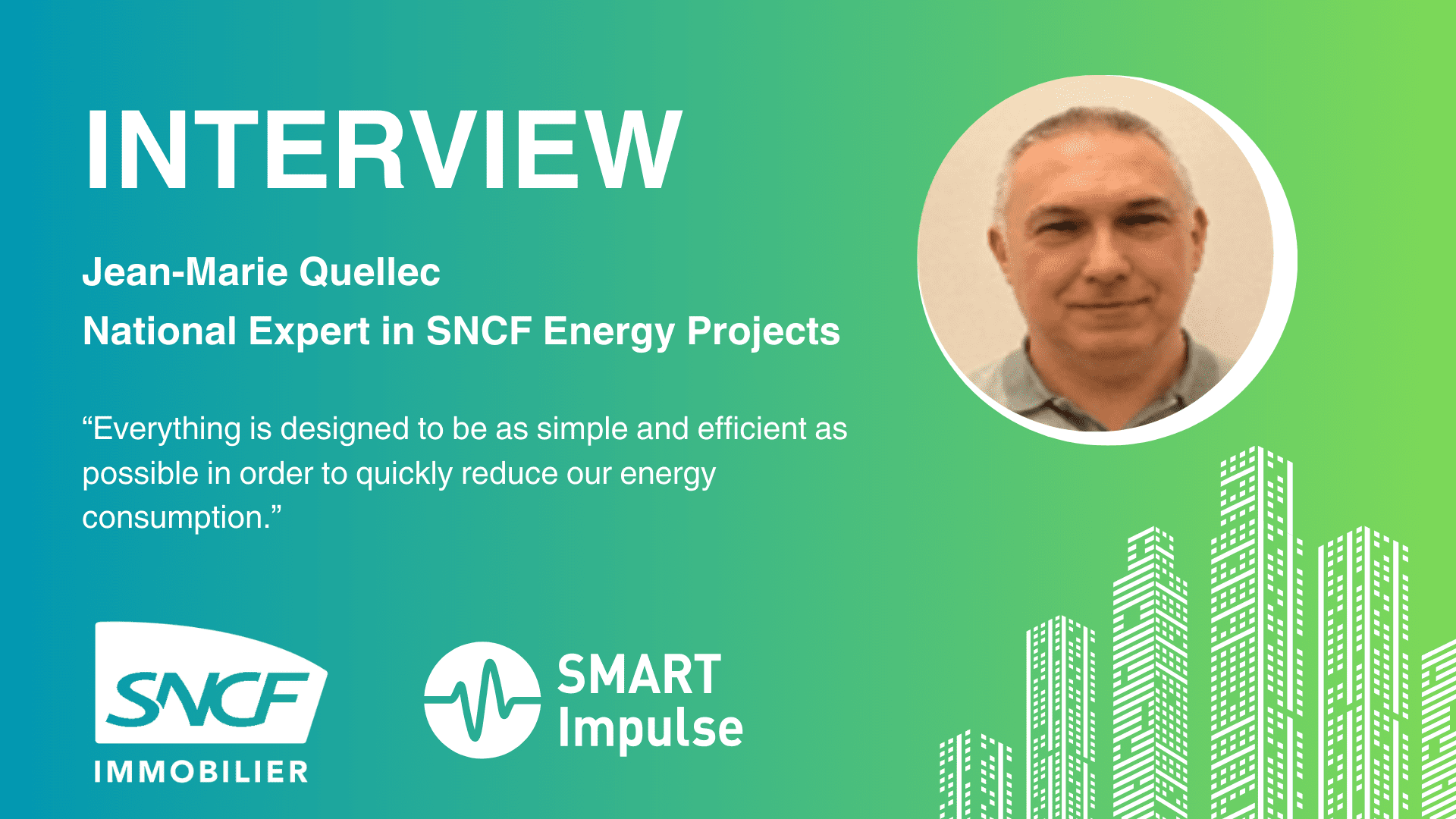
Low-carbon Trajectory: the SNCF Group chooses the Smart Impulse solution to address its challenges
The Smart Impulse solution was selected by the SNCF Group to accelerate low-carbon trajectory operations and participate in the regulatory compliance of the Group’s buildings. Discover the interview with Jean-Marie Quellec, National Energy Projects Expert, who discusses the challenges of this project…
How does SNCF currently position itself regarding its low-carbon trajectory challenges?
Jean-Marie Quellec: The SNCF Group has developed its low-carbon trajectory in line with decarbonisation goals (-50% CO² emissions) and energy consumption reduction (-40%) by 2030. To achieve this, it is crucial to better understand and manage our energy consumption. This involves improving our ability to accurately measure and analyse our consumptions.
Moreover, the BACS decree in France requires the implementation of metering tools to improve the energy efficiency of buildings by mandating the installation of energy regulation and measurement systems. The Smart Impulse solution plays a key role here, as it provides an energy consumption tracking and monitoring system that complements existing regulation systems.
Why did you choose Smart Impulse as a supplier to help with this approach?
JM Q: We conducted a call for tenders, which was won by Smart Impulse. They offer a high-performance, non-intrusive measurement solution that allows us to accurately monitor the distribution of electrical consumption by end-use without heavy intervention on our installations. Their technology perfectly matches our needs, especially for sites that do not have our internal remote reading system.
This solution offers a complementary alternative to other solutions deployed or being deployed: internal remote reading, Building Management Systems, to have a range of responses to different issues. The primary target is, of course, buildings with high electrical energy consumption.
Furthermore, the services already implemented on certain SNCF sites were satisfactory, reassuring us of their ability to effectively support us in our energy transition goals.
The Smart Impulse solution has already been implemented on some sites. Can you tell us about the results obtained?
JM Q: Absolutely. Pilot sites, technicentres, and several large tertiary buildings have tested the Smart Impulse solution. These pilots produced convincing results. We were able to precisely identify the main areas of energy consumption and detect consumption drifts that were previously unknown to us. With this data, we implemented targeted actions to reduce energy consumption, such as optimising heating systems, ventilation, and LED lighting, and so on.
For example, on a 20,000 sqm office building, the installation took less than 1hour and a half without any power interruption. It allowed us to precisely monitor consumption by end-use and the electricity production mix (including photovoltaic production monitoring). The actions implemented, such as optimising air handling units (AHU) and adjusting server temperature settings, resulted in savings of 12%, equating to €11,400 per year, with a return on investment in under 6 months.
The feedback from pilot sites also validated the effectiveness of the real-time monitoring and non-intrusive metering solution offered by Smart Impulse. This confirmed our choice and encouraged us to deploy their solution more widely across our network to accelerate our transition to greater energy sobriety.
How is the Smart Impulse solution ordered?
JM Q: The order process involves several steps. With the framework agreement in place, focus entities (Real Estate Directorate, activities, establishments) provide Smart Impulse with information about the buildings, their electrical usage, and equipment. Once the techno-economic file is built, we validate the order, which includes equipment installation, data access, and support from a Smart Impulse energy efficiency expert. Everything is designed to be as simple and efficient as possible to quickly reduce our energy consumption.
What impact do you expect from this collaboration with Smart Impulse?
JM Q: We expect this collaboration to yield concrete improvements in terms of a finer understanding and management of our energy consumption. The goal is to master our energy usage, isolate specific processes, quickly detect any drifts, prioritise optimisation actions, and ultimately reduce our energy bill while contributing to our carbon footprint reduction goals. We hope to accelerate our transition to a more rational and responsible use of energy while meeting the requirements of both the BACS and Tertiary Decrees.
What do you see as the main advantages offered by this solution?
JM Q: I would highlight primarily the fast implementation of the solution and the creation of user-friendly dashboards with data distribution by end-use, within less than three months.
Additionally, the comprehensive energy management support included in the offer adds real value beyond just obtaining data. This includes a diagnosis, action plan proposals, and results monitoring, with a dedicated energy efficiency expert for each project.
It is important to easily retrieve data on our energy consumption, and for this, we have an Energy Management Portal at SNCF, which is our internal tool. Thanks to an API, the Smart Impulse solution ensures interoperability with this platform to upload data, which is essential for our users.
Finally, we work closely with Smart Impulse to configure their application to evolve the dashboards to be best suited to our equipment and, above all, easy to understand and use by our teams.
Do you also have low-carbon trajectory challenges? Contact us


